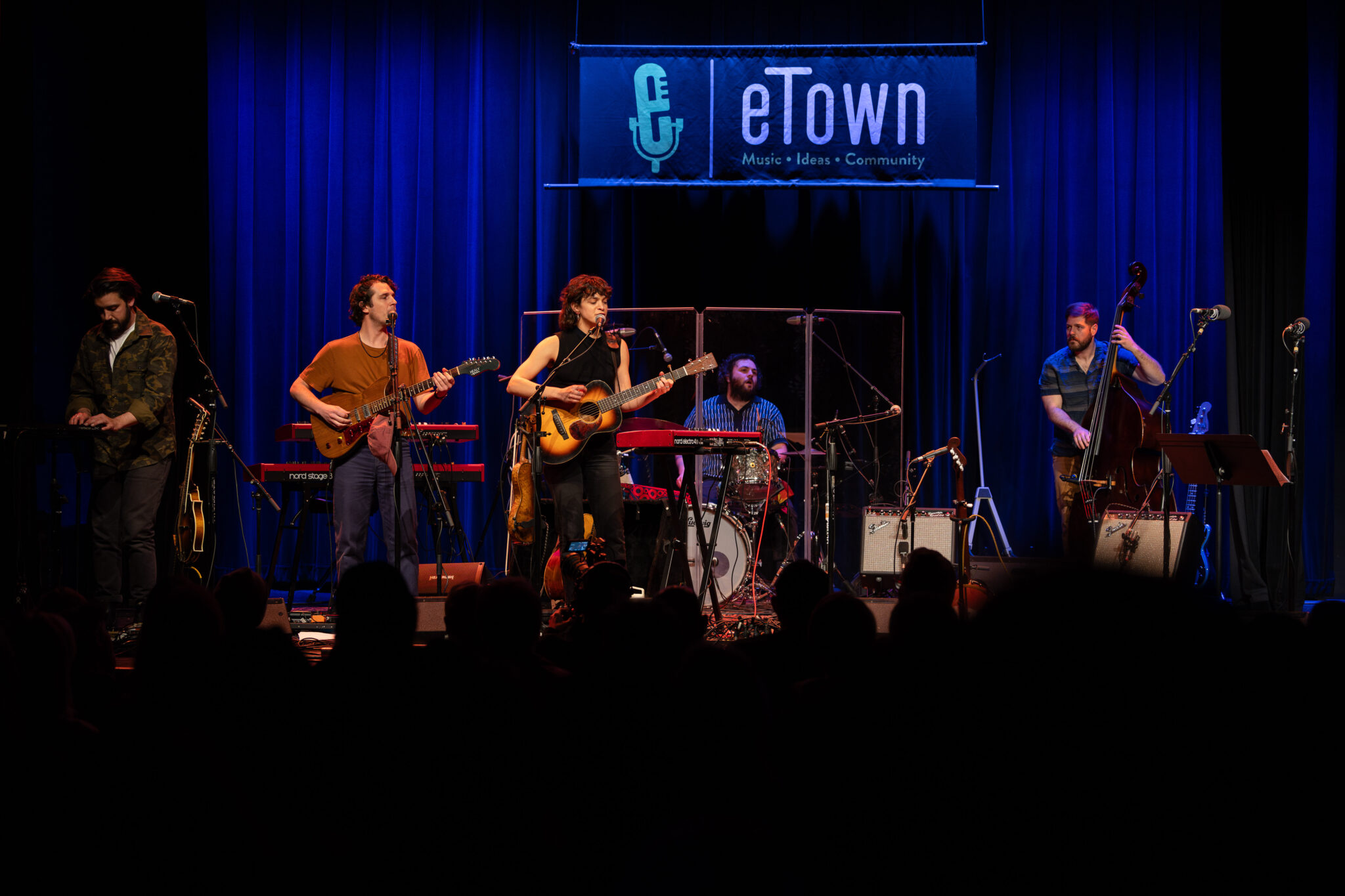This week’s eTown show features musical guests Mipso and Jake Xerxes Fussell. Mipso’s enchanting blend of folk, bluegrass, and indie-rock promises to carry you away on a melodic journey, their harmonies weaving tales of heartache and hope. Jake Xerxes Fussell adds a soulful touch with his deep-rooted Southern sound, effortlessly channeling the spirit of traditional American music. Nick also has an insightful interview with Steve Weiss, curator of UNC Chapel Hill’s Southern Folklife Collection, that offers invaluable insights into the cultural significance of folk music and its enduring impact on society.
Mipso

Mipso formed in 2012 as an excuse to play together between classes in Chapel Hill. Joseph Terrell came from a family of banjo-playing uncles and a guitarist grandma, and he’d gotten curious again about the string band music he’d heard as a kid. Jacob Sharp was raised on equal parts Doc Watson and Avett Brothers in the mountains of North Carolina and he was hunting for a chance to sing some harmonies. Wood Robinson added a Charlie Haden-esque interest in bridging jazz and grass sensibilities on the double bass, and Libby Rodenbough soon joined on fiddle, unsatisfied by her classical violin training but drawn like a moth toward the glow of old, weird Americana.
Their first album, Dark Holler Pop, produced by Andrew Marlin (Watchhouse), included Terrell-penned fan favorites “Louise” and “Couple Acres Greener” and turned recent-grads Mipso (“let’s try this for a year,” etc.) into a full-blown touring band. Although it hung out on the Billboard Bluegrass top 10, its sonic mission statement was in the name: Dark Holler Pop was groovier and catchier than its string band contemporaries; its unabashed poppiness belied the songs’ durability and depth.
2015’s Old Time Reverie earned them an invitation to perform in the Macy’s Thanksgiving Day Parade wherein they rolled down 5th Avenue on a 12 foot bucket of fried chicken. They got to have breakfast on the green room bus with Pat Benatar and Questlove, but in hindsight the whole experience was a little beside the point. They doubled down on touring, playing upwards of 175 shows a year, honing a telepathic, sibling-esque connection onstage.
2017’s Coming Down The Mountain, produced by Brad Cook (Bon Iver, Waxahatchee) added drums and pedal steel and put the band on bigger stages with an expanded Americana sound, including the Rodenbough-fronted title track, another streaming hit and live staple.
Mipso considered hanging up their hats in 2018 while recording Edges Run with Todd Sickafoose (Ani DiFranco, Anais Mitchell). After five years of near-constant touring, they had started to wake up in hotel rooms wondering what state they were in; they’d never had pets. The album took off. Sharp’s intimate vocal on “People Change” floated into dorm rooms and coffee shops across America, cementing Mipso as a bona fide streaming success across four albums and placing them in that rarefied strata of bands with three distinct lead singers: The Band, Fleetwood Mac, The Beatles, Sonic Youth, The Wailers, The B-52’s, Phish, Mipso. 2020’s self-titled start-fresh album on Rounder Records brought experimental Canadian producer Sandro Perri into the mix and minted a collection with moodier landscapes and unexpected textures such as “Hey, Coyote” and “Big Star”.
Post-pandemic Mipso is starting fresh again with Book of Fools. The songs might be their best yet: “Carolina Rolling By” shows Terrell at his most relaxed and confident while the band turns a story of a pill-popping truck driver into a meditative cosmic country-tinged head bopper. “The Numbers” flirts with 60s surf rock while Rodenbough winks and wags a finger at our market-obsessed culture, and “Broken Heart/Open Heart” features Sharp at his most heart-wrenching and earnest. Other standouts “East” and “Radio Hell” will infect you with earworms made of guitar riffs, Robinson’s pretzel-twisted upright bass lines, and saturated “ooohs” drifting in as if on AM radio waves.
Rock, country, indie-Americana: genre descriptors try but miss the point, which is that these four people and only these four people could’ve made this album. Only a decade in the van could’ve made this album. Only four personalities held in sustained, frictional balance could’ve made this album with its sizzling energy and unlikely cohesion. Mipso did it again. These are searching, driving songs from a band that’s still trying to say something different, still going somewhere new.
Jake Xerxes Fussell

Durham, North Carolina singer, guitarist, and folksong interpreter Jake Xerxes Fussell (yes, that’s his real middle name, after Georgia potter D.X. Gordy) has distinguished himself as one of his generation’s preeminent interpreters of traditional (and not so traditional) “folk” songs, a practice which he approaches with a refreshingly unfussy lack of nostalgia and preciousness. By recontextualizing ancient vernacular songs and sources of the American South, he allows them to breathe and speak for themselves and for himself; he alternately inhabits them and allows them to inhabit him. In all his work, Fussell humanizes his material with his own profound curatorial and interpretive gifts, unmooring stories and melodies from their specific eras and origins and setting them adrift in our own waterways. The robust burr of his voice, which periodically melts and catches at a particularly tender turn of phrase, and the swung rhythmic undertow of exquisite, seemingly effortless guitar-playing pull new valences of meaning from ostensibly antique songs and subjects.
Steve Weiss

Steve Weiss is curator of the University of North Carolina’s Southern Folklife Collection, one of the foremost archives of Southern music, art, and culture. In this role he oversees collecting, preservation, access, and outreach for the collection. He also produces a series of archival recordings from collection on YepRoc Records, that includes Doc Watson, Live at Club 47 and a reissue of Dolly Parton’s first single “Puppy Love/Girl Left Alone” which she recorded at the age of 13 for Goldband Records. He is currently working on a reissue of Cajun accordionist Iry LeJeune’s complete recordings to be released later this year. Prior to his work at UNC, he worked for CNN’s Washington DC Bureau and the Motion Picture, Sound and Video Branch of the National Archives and Records Administration. The son of Cuban Jewish immigrants, Steve grew up in the Appalachian region of Western Maryland and now lives in Chapel Hill, North Carolina with his family.
